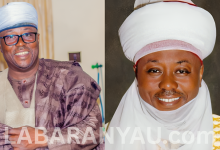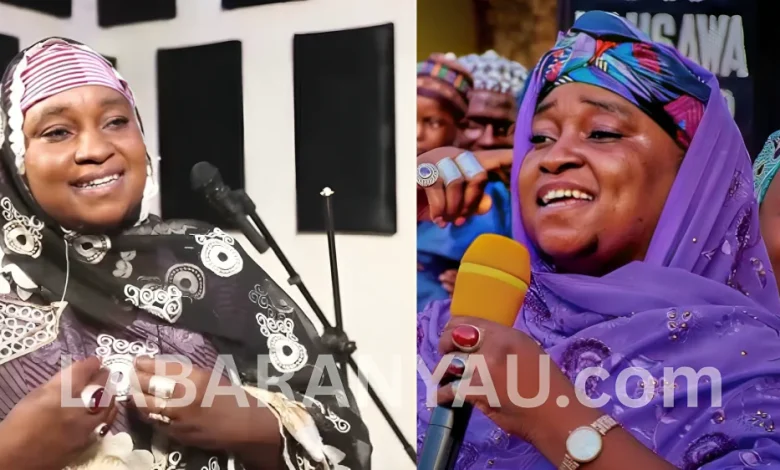
Maryam Fantimoti Biography
Maryam Saleh Muhammad, popularly known as Maryam Fantimoti, is a veteran Hausa singer and songwriter from Kano, Nigeria, who began her musical journey at the age of 8 through religious choirs and mandiri groups.
She rose to fame in the late 1990s and early 2000s, particularly around 1999–2000, when she joined the Kannywood industry, gaining popularity with her hit song “Fantimoti”, which later became her stage name.
With support from actor Ali Nuhu, she collaborated with many top industry figures and became known for her unique blend of traditional and modern Hausa music, including love, political, and religious songs.
In 2024, she released “Bawumia Ikon Allah”, a campaign song for Ghana’s Vice President, Dr. Mahamudu Bawumia, showing her musical influence across West Africa.
Over two decades into her career, she is revered as “Maman Mawaka” (Mother of Singers) for her mentorship and legacy in the Hausa music scene.
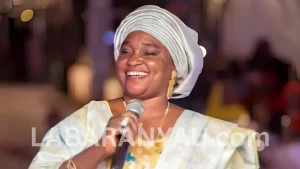
Maryam Fantimoti Wikipedia
| Fact | Details |
|---|---|
| Full Name | Maryam Saleh Muhammad |
| Stage Name | Maryam Fantimoti |
| Birthplace | Kano, Nigeria |
| Early Musical Start | Began singing at age 8 in an Islamic religious choir and later joined a mandiri group |
| Kannywood Debut | Around 1999–2000, with the hit song “Fantimoti” |
| Popular Songs | “Fantimoti,” “Jigida,” “Wakar Aure,” “Matar Bahaushe,” “Soyayya Ta Gaskiya” |
| Notable Work | Released “Bawumia Ikon Allah” in 2024, a campaign song honoring Ghana’s Vice President |
| Nickname | “Maman Mawaka” (Mother of Singers) |
| Musical Themes | Love, religion, politics, and social values |
| Cultural Impact | Mentored emerging artists and promoted Hausa cultural heritage through music |
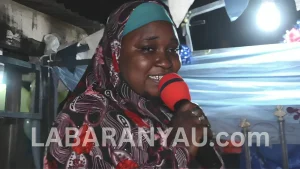
Maryam Fantimoti’s Early Life, Background, and Musical Beginnings
Maryam Saleh Muhammad, famously known as Maryam Fantimoti, was born and raised in Kano State, Nigeria, in the Gyadi-Gyadi area.
From a young age, she displayed a strong passion for music.
At just 8 years old, she began singing in an Islamiyya school choir, where she performed religious and devotional songs, particularly in praise of Prophet Muhammad (SAW).
This early exposure to Islamic music shaped her musical foundation. Later, she joined a mandiri group, a traditional form of Hausa religious music, where she further developed her skills and vocal expression.
Her upbringing in a religious and culturally rich environment laid the groundwork for her future success in both religious and secular Hausa music.
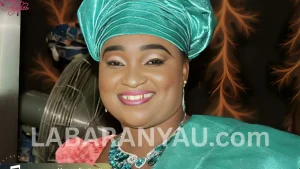
Maryam Fantimoti Rise in Kannywood
Maryam Fantimoti’s entry into the Kannywood film and music industry began in the late 1990s to early 2000s, around 1999–2000, marking a turning point in her career.
Her big break came with the release of her hit song “Fantimoti”, which not only became a household anthem but also earned her the stage name that she’s widely known by today.
Her talent quickly caught the attention of Kannywood insiders, especially Ali Nuhu, a prominent actor who played a key role in introducing her to the industry.
Maryam collaborated with other influential figures like Yakubu Muhammad and Mudassiru, becoming a sought-after singer for movie soundtracks.
Her voice became synonymous with Kannywood’s golden era, as she infused traditional Hausa rhythms with emotional depth, often performing songs of love, sorrow, and societal issues.
Her success during this period cemented her as a leading female voice in Kannywood and elevated her status as a pioneer of modern Hausa film music.
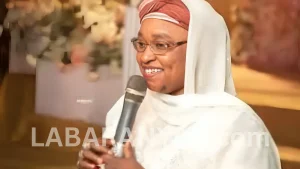
Maryam Fantimoti Musical Style and Contributions
Maryam Fantimoti is celebrated for her distinctive blend of traditional Hausa music with contemporary themes, making her one of the most influential voices in northern Nigerian music.
Her musical style is rooted in devotional and cultural expression, often incorporating deeply emotional vocals, traditional instruments, and poetic Hausa lyrics.
She is versatile, known for singing about love, politics, religion, and social values, which has allowed her to connect with a wide audience across generations.
One of her most iconic songs, “Jigida”, became a cultural favorite, especially among Hausa communities in Nigeria and Ghana.
In 2024, she extended her influence beyond Nigeria by releasing “Bawumia Ikon Allah,” a campaign song in honor of Ghana’s Vice President Dr. Mahamudu Bawumia, showcasing her reach and relevance in West African music.
Her ability to adapt to different contexts while maintaining cultural authenticity has made her not only a musical icon but also a mentor (“Maman Mawaka”) to upcoming Hausa artists.
Maryam Fantimoti’s Personal Life and Family
Maryam Fantimoti, whose real name is Maryam Saleh Muhammad, is known to be highly private about her personal life.
Despite her fame in the Hausa music industry and Kannywood, there is no publicly confirmed information regarding her marital status, children, or family background.
This level of privacy is common among many Northern Nigerian celebrities, where cultural values often encourage a clear separation between public careers and family matters.
While details about her family remain undisclosed, her professional legacy as a pioneer and mentor in Hausa music continues to shine, earning her immense respect and the title “Maman Mawaka” (Mother of Singers).
Maryam Fantimoti Awards and Recognition
While specific records of awards bestowed upon Maryam Fantimoti are not readily available in public sources, her enduring influence and contributions to the Hausa music and Kannywood film industry have earned her widespread acclaim.
She is affectionately known as “Maman Mawaka” (Mother of Singers), a testament to her role in mentoring and inspiring a new generation of artists.
Her ability to blend traditional Hausa musical elements with contemporary themes has solidified her status as a cultural icon in Northern Nigeria.
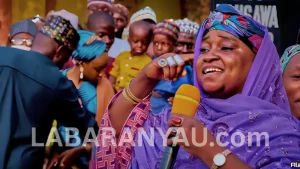
Maryam Fantimoti’s Legacy
Maryam Fantimoti has built a lasting legacy as one of the pioneering female voices in Hausa music and the Kannywood industry.
Her impact spans over two decades, during which she played a vital role in shaping the sound of modern Hausa film music.
Known for her emotional depth, poetic lyrics, and cultural authenticity, she inspired a generation of Hausa singers, earning her the title “Maman Mawaka” (Mother of Singers).
Her influence is especially significant in promoting female participation in a male-dominated industry, breaking barriers through talent, resilience, and consistency.
Beyond entertainment, her songs have touched on social, religious, and political themes, including her notable 2024 campaign song for Ghana’s Vice President, which expanded her relevance across West Africa.
Today, Maryam Fantimoti is not just remembered for her songs but for her cultural contributions, mentorship, and the legacy of empowerment she leaves behind in Northern Nigerian music.
FAQs
1: Who is Maryam Fantimoti?
Maryam Fantimoti is a renowned Hausa singer and songwriter from Kano, Nigeria, known for her unique blend of traditional Hausa music and contemporary themes.
2: How did Maryam Fantimoti get her stage name?
Her stage name “Fantimoti” comes from one of her early hit songs that gained widespread popularity in the late 1990s and early 2000s.
3: When did Maryam Fantimoti start her music career?
She began singing at the age of 8 in religious choirs and later officially entered the Kannywood music scene around 1999–2000.
4: What genres or themes does Maryam Fantimoti focus on in her music?
Her music covers love, religion, politics, and social values, often blending traditional Hausa sounds with modern influences.
5: What is Maryam Fantimoti’s contribution to Kannywood?
She helped popularize Hausa film music, providing soundtracks and hits that became part of Kannywood’s golden era, and she mentored many young artists.
6: Has Maryam Fantimoti received any awards?
While specific awards are not widely documented, she is affectionately called “Maman Mawaka” (Mother of Singers) in recognition of her influence and mentorship.
7: Is Maryam Fantimoti involved outside Nigerian music?
Yes, in 2024, she released a campaign song for Ghana’s Vice President, Dr. Mahamudu Bawumia, showing her influence across West Africa.
8: What is known about Maryam Fantimoti’s personal life?
She keeps her personal and family life private, in line with cultural norms in Northern Nigeria, with little public information available.
9: Why is Maryam Fantimoti considered a cultural icon?
Because of her longevity, her a role in promoting Hausa culture through music, her mentorship of upcoming artists, and her ability to address societal issues in her songs.
In conclusion
Maryam Fantimoti stands as a pioneering and influential figure in Hausa music and the Kannywood industry.
Starting her career from humble beginnings in Kano, she rose to prominence in the late 1990s and early 2000s with her soulful voice and memorable hits like “Fantimoti” and “Jigida.”
Her music beautifully blends traditional Hausa sounds with contemporary themes, addressing love, religion, politics, and social values, which has endeared her to fans across Nigeria and West Africa.
Known as “Maman Mawaka”, she has not only shaped the sound of modern Hausa music but also mentored countless emerging artists, breaking barriers for women in a male-dominated industry.
Though she keeps her personal life private, her cultural legacy and ongoing influence remain undeniable, making her a respected and celebrated icon in the African music scene.
Check Out: Fati Yola Biography, Wikipedia, Age, Early Life, Career, Personal Life, Net Worth, Legacy
Check Out: Zulaihat Dalhat (Zulai Lilisco) Biography, Wikipedia, Age, Career, Movies, Husband, Family, Legacy
Discover more from Labaran Yau
Subscribe to get the latest posts sent to your email.

















